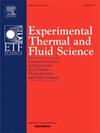Experimental study on the effects of fuel properties on spray macroscopic characteristics, particle size distribution, and velocity field in a constant volume chamber
IF 3.3
2区 工程技术
Q2 ENGINEERING, MECHANICAL
Experimental Thermal and Fluid Science
Pub Date : 2025-08-27
DOI:10.1016/j.expthermflusci.2025.111602
引用次数: 0
Abstract
With the growing energy crisis, clarifying the effects of fuel properties on the engine spray process is one of the critical researches to find new alternative fuels for engines. In this study, the spray macro characteristics, spray particle size distribution, and spray velocity field of various fuels (diesel/biodiesel/coal-to-liquids/aviation kerosene) in a constant volume chamber under different injection pressures and environmental conditions were studied using a spray visualization test platform. The effects of fuel properties such as density, kinematic viscosity, surface tension, and evaporation characteristics on spray parameters, particle size distributions, and velocity distributions were analyzed. The results showed that the physical properties of the fuels under different evaporation conditions affected the spray process to different degrees. The effect of kinematic viscosity was significant under low evaporation conditions. As the kinematic viscosity decreased, the fuel spread more easily, and the fuel spray velocity distribution was more uniform. The effect of fuel volatility on the spray process was enhanced in the presence of significant evaporation. The effects of spray conditions, environmental conditions, and fuel properties on the spray performance were synthesized, and the expression of SMD with respect to the dimensionless parameters We and Re was obtained. With the increase in We and Re, the kinetic energy of the fuel development increased, the jet was more easily broken, and the fuel was better atomized. The experimental analysis results provided in this study illustrate the influence mechanism of fuel physical properties on the fuel spray process, which can provide theoretical support for the improvement of engine fuel adaptability and can also provide ideas for the development of new fuels.
定容室中燃料性质对喷雾宏观特性、粒径分布及速度场影响的实验研究
随着能源危机的日益加剧,弄清燃料性质对发动机喷雾过程的影响是寻找新型发动机替代燃料的关键研究之一。本研究利用喷雾可视化测试平台,研究了不同喷射压力和环境条件下,不同燃料(柴油/生物柴油/煤制油/航空煤油)在定容室内的喷雾宏观特性、喷雾粒径分布和喷雾速度场。分析了燃料的密度、运动粘度、表面张力和蒸发特性对喷雾参数、粒径分布和速度分布的影响。结果表明,不同蒸发条件下燃料的物理性质对喷雾过程有不同程度的影响。在低蒸发条件下,运动粘度的影响是显著的。运动粘度越小,燃油越容易扩散,燃油喷射速度分布越均匀。燃油挥发性对喷雾过程的影响在显著蒸发的情况下得到增强。综合了喷雾条件、环境条件和燃料性能对喷雾性能的影响,得到了SMD与无因次参数We和Re的表达式。随着We和Re的增加,燃料发展的动能增加,射流更容易破碎,燃料的雾化效果更好。本研究提供的实验分析结果阐明了燃油物理性质对燃油喷射过程的影响机理,可为提高发动机燃油适应性提供理论支持,也可为新燃料的开发提供思路。
本文章由计算机程序翻译,如有差异,请以英文原文为准。
求助全文
约1分钟内获得全文
求助全文
来源期刊

Experimental Thermal and Fluid Science
工程技术-工程:机械
CiteScore
6.70
自引率
3.10%
发文量
159
审稿时长
34 days
期刊介绍:
Experimental Thermal and Fluid Science provides a forum for research emphasizing experimental work that enhances fundamental understanding of heat transfer, thermodynamics, and fluid mechanics. In addition to the principal areas of research, the journal covers research results in related fields, including combined heat and mass transfer, flows with phase transition, micro- and nano-scale systems, multiphase flow, combustion, radiative transfer, porous media, cryogenics, turbulence, and novel experimental techniques.
 求助内容:
求助内容: 应助结果提醒方式:
应助结果提醒方式:


